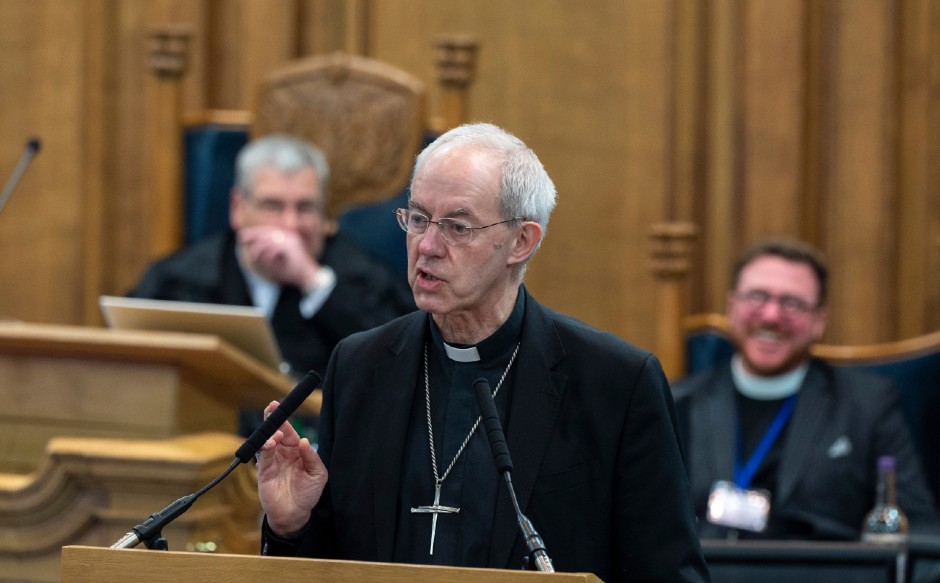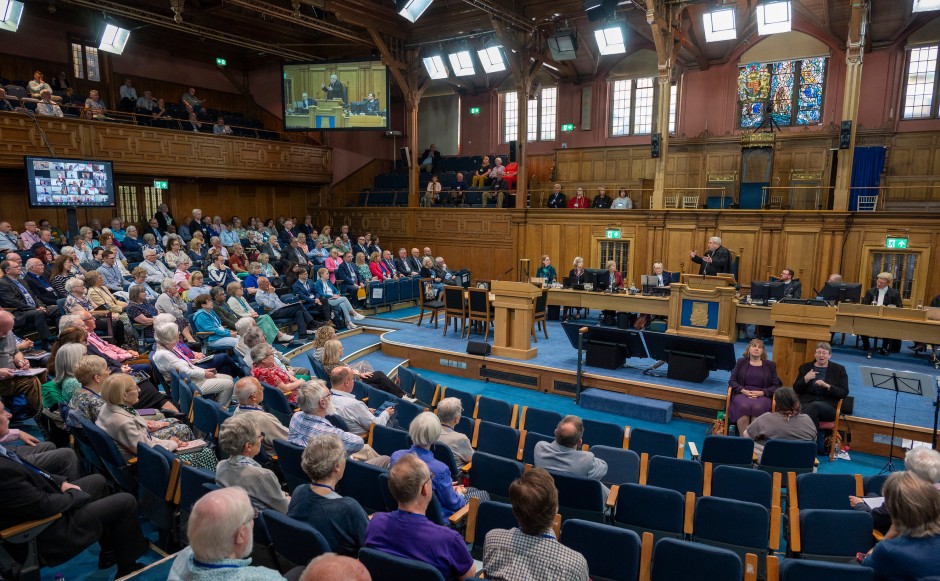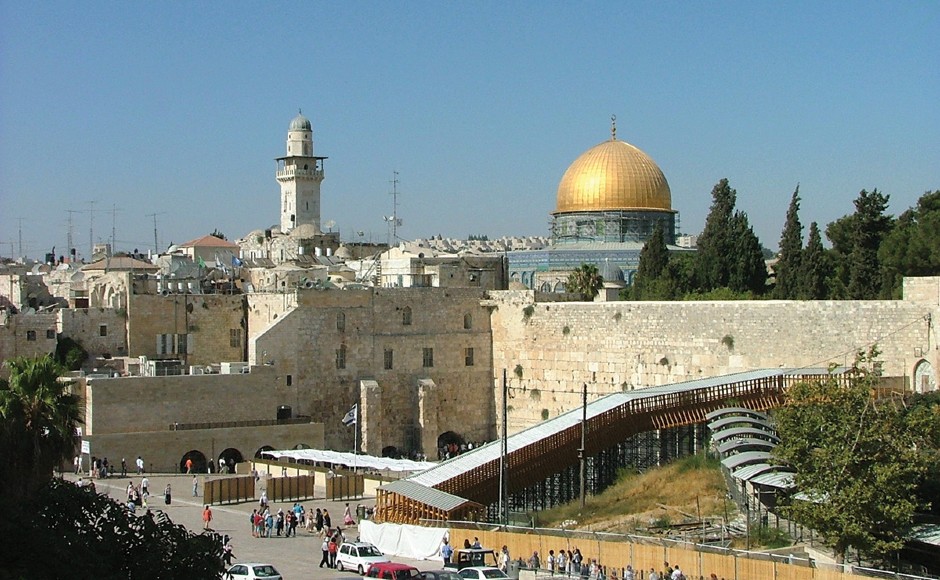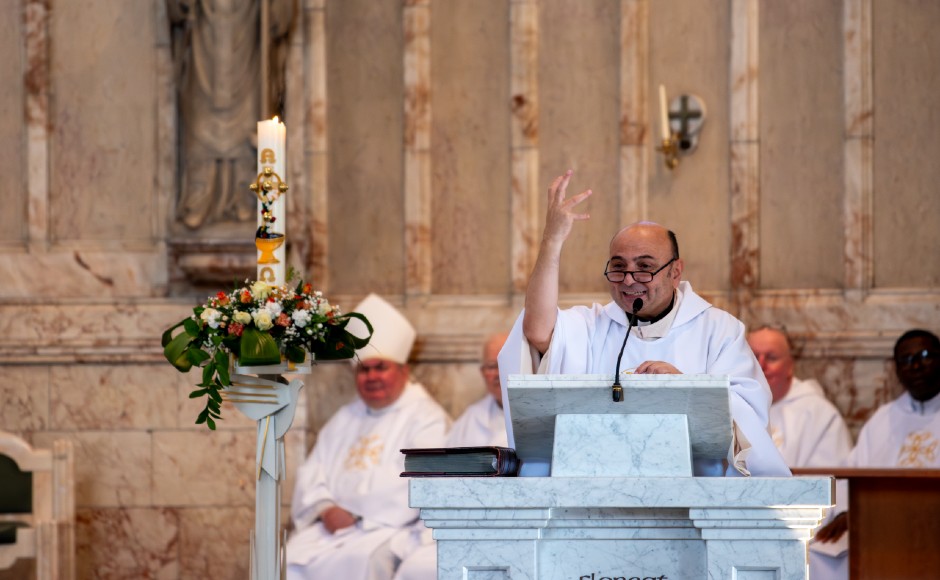Archbishop renews call for Gaza ceasefire as he addresses Kirk General Assembly
Published on 23 May 2024 7 minutes read
The Archbishop of Canterbury has issued a fresh call for a ceasefire to hostilities in Gaza.
Most Rev Justin Welby told the General Assembly today that it is clear that the "appalling war" will not lead to security for Israel or a free and secure Palestinian state.
He described the Church of England and the Church of Scotland as brothers and sisters in Christ and commended the immediate past Moderator, Very Rev Sally Foster-Fulton for speaking out against the war.

He said she had spoken "powerfully and prayerfully" in solidarity with our brothers and sisters in Christ in Gaza and across the Holy Land – and with all the peoples of the Holy Land, Jewish, Christian and Muslim.
The Archbishop said: "It is clear that this appalling war will not lead to security for Israel, for which we long and pray, nor to a free and secure Palestinian state, for which we long and pray.
"As I said recently, I repeat again today, we can only speak to the parties involved in this horror and implore that they choose life and not death.
"So, we continue to call for a ceasefire, for unfettered humanitarian aid, and for the release of all hostages and for the long term a resolution that provides for the for safety, equality, justice and freedom of all peoples Israeli and Palestinian.
"But we must also remember that in this 21st century wars are easily imported.
"Foreign hatreds in nations far away of which we know little easily become the conflict of our own country and our own time and place.
"The actions of a government abroad in Israel do not ever in any way justify hatred for our fellow citizens of Jewish background.
"For the Church of England and the Church of Scotland, our vocations as national Churches lead us to abhor anti-Semitism, that ancient evil.
"It is on the rise, and we must challenge it.
"And for the same reason we must stand alongside those of Muslim faith who are abused and insulted day by day by day on public transport and in many other places.
"Our Churches must be the mortar that holds together the diverse stones that so beautifully make up the United Kingdom."
Politics
The Archbishop said he was grateful that Rev Fiona Smith, Principal Clerk to the General Assembly, is a fellow President of the Council for Christians and Jews.
He said "we must listen deeply to each other, hear each other's perspectives and find good ways forward - we cannot do less."
The Archbishop said churches are in but not of the world, including the world of the state.
"We do not interfere in politics, though some of us are sometimes accused of doing so.
"We do our duty when we speak into politics," he added.
"It is duty, not choice. Where there is injustice, we must say so. Where there is hunger we must meet the need and speak against the cause."
"Whatever the future for the shape and size of the United Kingdom we will always be sisters and brothers in Christ, obedient to Jesus' command to love one another."
Reflecting on the upcoming UK General Election on 4 July, the Archbishop said: "My prayer for this General Election is that people vote in vast numbers first, treasuring the privilege of citizenship in this democracy.
"Who they vote for is their choice, not for Churches to say. The Churches of this land, I am sure, will contribute thoughtfully, respectfully and as servants seeking the common good.
"May the new parliament be also of that mind."
Partnership
The Archbishop congratulated the new Moderator of the General Assembly of the Church of Scotland Rt Rev Dr Shaw J Paterson.
"Moderator Shaw, my very warm congratulations at the beginning of this year of great demands on you and all who work with you and your family," he said.
"And please be assured of my prayers and our prayers and best wishes."
This is the second time that the Archbishop has addressed the General Assembly, the first time in 2016 when the Kirk signed the historic Columba Declaration with the Church of England.
The friendship agreement has led to significant ecumenical partnership working such as the joint pilgrimage of peace to South Sudan in February 2023.
The Archbishop, Pope Francis and the then Moderator of the General Assembly Rev Dr Iain Greenshields journeyed to the world's youngest nation to renew a commitment to peace and reconciliation and stand in solidarity with millions of ordinary people who are suffering profoundly from continued armed conflict, violence, floods and famine.
The Archbishop told commissioners that such a trip would have been "unthinkable in the very recent past in our lifetimes."
"We went to South Sudan not as leaders, but as servants," he said.
"More importantly, we went as brothers – as a visible sign of the unity and reconciliation that is possible through the grace of God.
"After centuries of division, violence and bloodshed, three different parts of God's one Church journeyed together to a place of profound and terrible violent conflict.
"We did so because we sought to be part of answering the prayer of Jesus Christ: that his followers would be one so that the world might know that he came from the Father."
Queen Elizabeth
The Archbishop urged the General Assembly to keep the people of South Sudan and the surrounding region in their prayers.
He described the death of Her Late Majesty Queen Elizabeth II as a "watershed moment" in our national life.
"We continue to mourn her loss and give thanks for her life and her example," added the Archbishop.
"Just over a year ago we witnessed the first coronation in most people's lifetimes and along with Moderator Iain it was a profound privilege to be part of it.
"The coronation service was the first in history to include the participation of ecumenical leaders beyond our two Churches as well as representatives of other faiths, making it a celebration and affirmation of the changing nature of the society of the United Kingdom, a society which is now recognised by the United Nations as being the most diverse nation on earth.
The Archbishop said coronations are constitutional statements as well as religious services.
"The coronation of 2023 took place in a UK that is, as I just said, far more diverse than it was in 1953 – and Scotland plays an enormous role in fostering and reflecting that diversity," he added.
"As established churches, albeit in different ways - the Churches of Scotland and England have a duty to protect the diversity of our nation and the free practise and flourishing of all faiths and beliefs in England and in Scotland.
"That was a duty articulated by her late Majesty, and one that the King has since reaffirmed most powerfully whilst also reaffirming his most profound Christian faith.
"The coronation reaffirmed as well that our privileges as the Church of Scotland and Church of England are in fact obligations, as the King said and the liturgy proclaimed, we are not here to be served but to serve."
Violent conflict
His Grace, the Duke of Edinburgh, is representing King Charles III as the Lord High Commissioner to the General Assembly.
Prince Edward is accompanied by his wife, the Duchess of Edinburgh.
The Archbishop said: " want to acknowledge here the great work that Her Grace the Duchess of Edinburgh has been doing and continues to do with women caught up in violent conflict and are sexually abused in conflict."
He noted that "84% of the Church of Scotland's congregations are engaged in tackling food poverty, tragic though it is that it exists.
"And some two-thirds of your churches are involved in school chaplaincy and community development," added the Archbishop.
"It is the sovereign work of God that makes that service possible and the raw heroism of so many people in our churches."
Cross
The Archbishop emphasised the necessity of "bearing the Cross and following Jesus."
"A Church that chooses any other way is at best a charity with pointy roofs and at worst a deception that will be corrupted," he said.
"In discipleship, lived, shared and proclaimed we discover afresh each day the faithfulness of God, whose goodness and providence is infinitely greater than our feeble, fragile, failures.
"For in imitating God, who carried the Cross, we become cross-shaped and thus God-shaped, and we become a Church, a single Church, of the 21t century that lives, grows, serves and glorifies its Creator."
The Archbishop said the churches remain called to take up the cross and follow Christ, bearing its weight, sharing the abuse he suffered, enduring the mockery, never holding to power but instead faithfully Christian.
"The discipleship of individual and Church is an absolute," he added.
"There is never a moment when any other loyalty can compete with that owed to God in Christ - all churches share that.
"Loyalty to God comes before nation, culture, race or any other claim."


